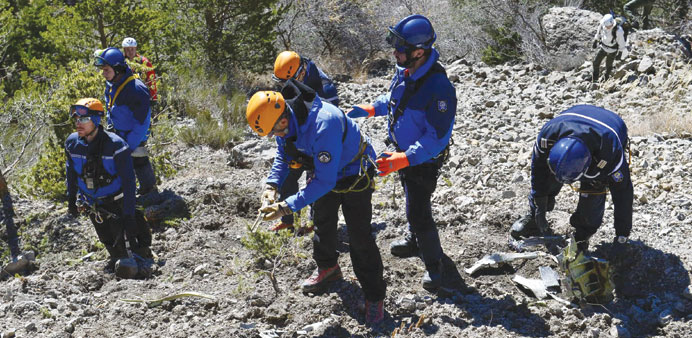A French team investigating the crash site of the Germanwings Airbus A320 near Le Vernet, French Alps. The Germanwings co-pilot who flew his Airbus into the French Alps, killing all 150 aboard, hid a serious illness from the airline, prosecutors said yesterday amid reports he was severely depressed.
By Bill Smith/DPA
British authorities yesterday asked airlines to review flight procedures but defended their system of pilot health checks amid concern that some airlines conduct only cursory mental health assessments.
Britain’s Civil Aviation Authority (CAA) said it was co-ordinating its response with the European Aviation Safety Agency (EASA) and has “contacted all UK operators to require them to review all relevant procedures” following Wednesday’s Germanwings crash.
“All UK airline pilots undergo extensive and regular medical assessments to determine their fitness to hold a licence,” the CAA said.
“As part of this, aeromedical examiners are required to assess a commercial pilot’s mental health at each medical examination which, for an airline pilot flying with at least one other pilot, is undertaken annually.
“These detailed medical assessments are in line with international aviation standards,” it said.
But a former pilot with budget carrier easyJet says psychological assessments are merely an implicit part of the doctors’ examinations of pilots’ physical health.
“The doctors talk to you, and they’re switched-on guys, but there’s no formal (psychological) assessment,” said the former pilot, who left the airline last year.
The British Medical Association said it does not issue guidelines for doctors conducting health checks on pilots and that practices are decided by individual airlines.
The British Airline Pilots Association (BALPA) said working pilots have a “strict, open culture to report and support crew showing any sign of stress or mental health issues” .
Assessments of mental health are also made during pilots’ training, BALPA said.
But in practice, “everyone passes” their training with budget airlines, the former pilot told dpa.
“If they need extra training they just pay for a little bit more,” he said, referring to the recent trend of budget airlines recruiting young, inexperienced pilots who self-finance their training.
“Everything was being attacked in terms of cost savings,” he said of his experience with the budget carrier. “They (the savings) all take away from the quality of the trainees.”
“They can barely fly, initially, when they get their (pilot’s) licence,” the former pilot said of the new recruits.
The budget airline required trainee pilots to complete just six test landings before carrying passengers, he said, compared with a minimum of 20 landings for a major international airline he previously flew with.
BALPA is campaigning for better employment conditions for pilots in the face of increasing “casualisation,” particularly in budget airlines.
“Casualisation and the use of contract labour is a growing issue in many industries, (and) regrettably aviation is no exception,” it said.
“Driven by short-term cost benefits to the employer and a seemingly endless supply of young pilots willing to pay out 120,000 pounds to ‘live the dream,’ the practice is most prevalent in low-cost operations.”
The campaign led to easyJet agreeing a “new entrant contract” that limits trainee pilots’ probationary employment through an agency to 12 months after which they will become easyJet employees, BALPA said.
An EU-backed study published by the University of Ghent last month found a similar “dramatic rise in ‘self-employment’ and zero-hours contracts for crew on European aircraft.”
“An alarming number of pilots are working with no direct link to the airline they actually fly for, with some airlines - especially in the low-fares sector - drawing significantly upon a ‘casualised’ workforce,” said a statement from the European Cockpit Association, which represents pilots.
Emmanuel Jahan, who heads the European civil aviation group that commissioned the survey, said the results showed that “casualised” pilots were “worrying about their working conditions and where to pay their taxes and social security.”
“This puts crew under disproportionate strain,” Jahan said.

